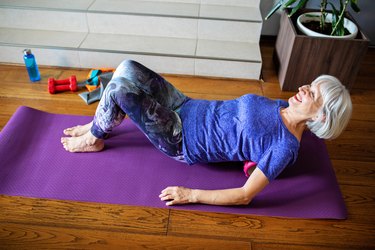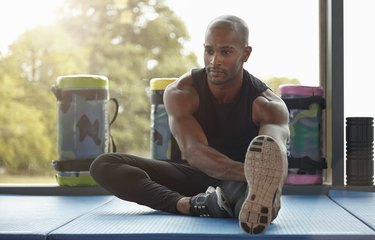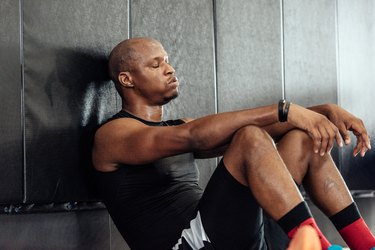

As you age, your workouts tend to feel harder and you might notice you have more lingering muscle soreness or feel more tired after exercise than you used to.
But with a little extra focus on your post-workout recovery habits and some healthy lifestyle tweaks, you'll be able to keep crushing your workouts without feeling so beat-up afterward.
Video of the Day
Video of the Day
What Is Muscle Recovery, Exactly?
Post-workout recovery is the time it takes after a workout for muscle fatigue and soreness to dissipate so you're ready to work out again. Recovery tools, such as foam rollers, compression leggings and electronic muscle stimulation devices, help you speed up the healing process so your muscles build back stronger for the next workout.
But muscle recovery is so much more than using fancy gadgets and tools; it's about what's going on inside your body. Even after your workout is done, your body continues to work hard to rebuild proteins in your muscles that were just damaged and replenish glycogen (carbohydrates the body stores so that it can be used for energy) that you just depleted.
As this all happens, you might feel tired or sore. Delayed-onset muscle soreness (DOMS) will likely set in a day or two after your workout, especially if you did intense exercise or are new to working out.
Related Reading
Why Muscle Recovery Gets Harder With Age
There are a handful of reasons you might feel like muscle recovery time has increased as you've gotten older or that you need more time to recover after a workout that never used to leave you feeling so spent.
1. You Have Fewer Muscle Fibers
"During the aging process, we are losing the size of the muscle fibers as well as the number of muscle fibers [also known as sarcopenia]," Ellen Anderson, PT, PhD, associate professor in the department of rehabilitation and movement sciences at Rutgers School of Health Professions, tells LIVESTRONG.com.
And while strength training is essential to slow down sarcopenia, your muscles still naturally change over the decades. The rate of change depends on your baseline activity level, meaning if you've been exercising consistently, then your muscles will change at a slower rate than someone who's sedentary, says Meagan Jozwiak, MD, a sports medicine physician at Northwestern Medicine Central DuPage Hospital.
Over time, as your muscles change, you may notice you can't handle the same load anymore or that you fatigue more easily. "Trying to push yourself to do what you could do years ago is more and more taxing to the muscles themselves, so recovery tends to be longer," Dr. Jozwiak says
2. Your Brain-Muscle Connection Weakens
There are also changes to your neuromuscular system — your brain and muscles working together to help you perform exercises. This connection between your brain and muscles is what helps you move weight more efficiently and effectively.
"If you're doing the workouts you've always done, but the size of your muscles is less and you have fewer muscle fibers and neuromuscular connections, you're really working hard on what you have left," Anderson says.
3. Your Connective Tissues Are Weaker
On top of all that, other structures and systems in the body that change with age. Connective tissues — like tendons, blood vessels, tissues in the arteries and tissues surrounding your joints — start to degrade as you naturally lose collagen and elastin (proteins in connective tissue) with age, Anderson says.
This causes your vascular system to become compromised, resulting in less blood flow to your skeletal muscles. And changes in the tendons — which attach muscles to bones — paired with changes in muscle structure, are often what makes your muscles feel tighter and sorer, Anderson says.
4. Your Body's Healing Process Is Delayed
The final reason: Older adults have a delayed inflammatory response, thanks to age-related changes to your immune system, Anderson says.
When there's stress on a part of your body, your body's inflammatory response kicks in and sends more blood to the area to deliver white blood cells and other important immune-system components to start the healing process.
"You don't want too much inflammation because then things are swollen, but you want just enough to help in the healing process," Anderson says. If this response is delayed, it may take a little longer for your muscles and tissues to get what they need to recover.
Related Reading
6 Ways to Support Muscle Recovery as You Get Older
You don't necessarily have to do anything new or different during your post-workout recovery routine as you get older, but focusing on rest-day rules you might have been ignoring can help make the healing process more effective. Here's how to speed up muscle recovery.
1. Focus on Nutrition
Following a well-balanced diet and making sure to eat before and after a workout help with workout recovery and keep your metabolism humming, Dr. Jozwiak says. That means fueling up on protein, which helps you rebuild muscles, and carbohydrates, which you need to replenish your glycogen stores.
"If you're not getting an optimal protein and carbohydrate combination after your workouts, it's going to take you longer to recover from any workout, but in particular, a harder workout," says Lance C. Dalleck, PhD, professor of exercise and sport science at Western Colorado University and American Council on Exercise scientific advisory panel member.
As you get older, you may want to increase your protein intake throughout the day, since older people need more protein, in general, than they required previously, Anderson says.
According to a June 2016 review in Nutrients, muscle tissue becomes less responsive to protein over the decades, but consuming more can help combat this change. (Exactly how much more isn't super clear; the best way to know what's right for you is to consult a dietitian.)
2. Stay Hydrated
"In general, older adults will move toward being dehydrated sooner or as a resting state because their physiology is working against them," Anderson says. "So paying attention to hydration is important." Experts suggest hydrating throughout the day instead of trying to chug a bunch of water at the end of the day when you remember.
Your body needs water to properly break down food to create energy. It also needs H2O to regulate your body temperature and maintain the right blood volume, which is important for cardiovascular function. All of these things can factor into how you feel — and how you recover — post-workout.
3. Make Time to Stretch
Working on flexibility can help minimize stiffness, Anderson says. The best time to do it is after a workout when your muscles and tendons are warm and stretch more easily.
"Stretching doesn't necessarily mean you won't be sore, but you're going to be able to deal with the stiffness more effectively if you do some flexibility training after your workout," Andersons says.
Hold each stretch for at least 30 seconds. Focus on the areas you just worked and the areas you know tend to get stiff, like your lower back or hamstrings.
"A brief stretch after a workout can help you combat that stiffness that's occurring because of normal aging changes," Anderson says. Increased flexibility and mobility will also help you maintain muscle and joint function for longer and can help you recover better if you have any sort of health emergency.
"A number of studies on the benefits of yoga and tai chi show they help not just with general flexibility and fitness but also improve outcomes for people who have been hospitalized," Dr. Jozwiak says.
4. Get Enough Sleep
Sleep is an under-appreciated part of muscle recovery, Dalleck says. According to the National Institutes of Health, deep sleep triggers the release of a hormone that boosts muscle mass and helps repair cells and tissues.
"We spend so much time thinking about the workouts and nutrition and compression therapy or heat or cold and kind of ignore just the basics of getting a good night of sleep," he says. "As people get older, sleep can be more challenging, so that's going to impact a lot of things including recovery."
Lack of sleep can mess with your hormones, specifically boosting stress hormones, Dalleck says.
"We start to see increased cortisol and epinephrine levels, and these hormones tend to inhibit muscle building," Dalleck says. Chronic sleep deprivation can keep these hormones out of whack and mess with everything from your heart health to your ability to recover properly after a tough workout.
5. Try Heat Therapy
Treating your muscles to some post-workout heat — like from a hot tub or sauna — can help increase blood flow to your muscles, Dalleck says. Increased blood flow helps remove waste products that accumulate during exercise and transport nutrients and healing cells to the damaged muscles, he says.
"If you do eat the right combo of carbs and proteins, that can get to skeletal muscle and help repair damaged muscles and replenish glycogen," Dalleck says. "It gets there more quickly if there's better blood flow."
In fact, an October 2020 review in Exercise and Sport Sciences Review found that local heat stress may positively impact your muscles and vascular system after strenuous exercise. Dalleck, who has studied the topic of heat and recovery, says that taking a dip in a hot tub or wearing a sauna suit post-workout can help encourage better recovery. As long as you're doing it safely, it's worth a try.
Warning
Hot tubs can be contraindicated for people with heart conditions, so always talk to your doctor first.
6. Give Yourself More Time to Recover
Listen to your body: If your muscles are really sore and tired, it's not worth pushing through. "Pushing through soreness can cause more harm than good," Dr. Jozwiak says. In this case, the best solution might be adding more recovery days into your routine.
Just two days of strength training per week is enough to spark muscle growth and build strength — so don't get discouraged if you need an extra day or two to recover and have to cut one of your planned workouts.
"Even though it doesn't seem like you're doing much, it does show a physiological benefit," Dr. Jozwiak says.
A little soreness is OK, but if you're so sore that you hurt during everyday activities, that's a sign you need to scale back, either in intensity or days. Rest and recovery are essential for getting stronger and maintaining physical health as you age, so don't be afraid to do more of it if it's what your body is asking for.
Ultimately, if you're doing all of these things, you shouldn't notice a huge difference in your recovery as you age, Dalleck says. It'll happen gradually but shouldn't impact you so greatly that you notice a drastic change.
"There's just going to be a slight increase in added time with each decade," he says. Just remember how much more quickly those changes would happen if you stopped being active and know that you're already doing great things for your body by moving it regularly.
Was this article helpful?
150 Characters Max
0/150
Thank you for sharing!
Thank you for your feedback!


